| Construction Rating: | starstarstarstarstar |
| Flight Rating: | starstarstarstarstar_border |
| Overall Rating: | starstarstarstarstar_border |
| Published: | 2010-04-14 |
| Manufacturer: | Sunward Aerospace  |
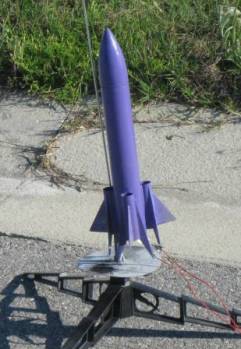
Brief:
Sunward Aerospace LTD's, Tri-Force, look futuristic with it's fin on pod arrangement boasts 9
laser cut fins set on three pods. Standing 14 inches tall and 1.637 inches in diameter, the Tri-Force is a good looking
rocket. It has an 18" plastic parachute.
Construction:
The Tri-Force kit contains the following parts:
- 1 BT-60 8” Body tube
- 2 Centering Rings
- 1 18mm Engine Tube
- 1 Engine Thrust Ring
- 1 Nose Cone
- 1 Screw Eye
- 6 Laser Cut Main Fins
- 3 Laser Cut Edge Fins
- 1 Launch Lug
- 1 18” Parachute
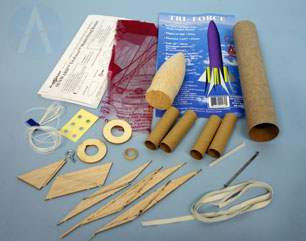
- 1 Strip of Parachute Reinforcement Rings
- 1 Metal Engine Hook
- 1 Elastic Shock Cord
- 1 Parachute Assembly String
- 3 3” BT-20 Tubes for Pods
All parts in the instructions were in the kit. The laser cutting of the fins is so good, that three of the small main fins were loose in the kit and the tips got damaged in shipment. I sent an email to Sunward informing them of the problem and they corrected it immediately with no questions and a nice apology for the inconvenience.
The directions for the rocket are multi step within a step. So make sure to read all the pages a few
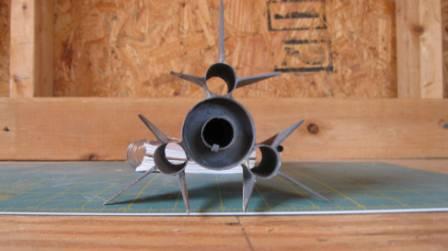 times
prior to the build. Step one has you cutting out the main tube marking template then setting it aside. Step two builds
the motor mount assembly. Steps three through nine have you marking all the tubes and mounting the fins to the pods,
and them to the main body tube. Step ten mounts the motor assembly. The thin plywood centering rings made this an easy
task they slid right into the tube. I did install the motor mount in the rocket before I installed the pods. I think it
is easier to do this when the main body tube has no fins. You can push the motor mount in and even the two tube without
the obstruction of the fins. The laser cutting of the fins is so clean three were already loose in the kit. They have
been replaced no questions. The only variation I did to the kit was I installed the Sunward BT60 Baffle Kit. When you
install the baffle, keep the baffle, moving, in the tube until it gets where you want it. If you pause it will stick,
like it did to me. The tube wrapping templates for the pods were a little short and I extrapolated the edge fin line.
Basically it is a standard four fin mount pattern.
times
prior to the build. Step one has you cutting out the main tube marking template then setting it aside. Step two builds
the motor mount assembly. Steps three through nine have you marking all the tubes and mounting the fins to the pods,
and them to the main body tube. Step ten mounts the motor assembly. The thin plywood centering rings made this an easy
task they slid right into the tube. I did install the motor mount in the rocket before I installed the pods. I think it
is easier to do this when the main body tube has no fins. You can push the motor mount in and even the two tube without
the obstruction of the fins. The laser cutting of the fins is so clean three were already loose in the kit. They have
been replaced no questions. The only variation I did to the kit was I installed the Sunward BT60 Baffle Kit. When you
install the baffle, keep the baffle, moving, in the tube until it gets where you want it. If you pause it will stick,
like it did to me. The tube wrapping templates for the pods were a little short and I extrapolated the edge fin line.
Basically it is a standard four fin mount pattern. 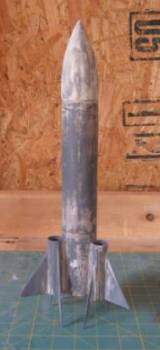
Pros: Fun Build
Good instructions easy to follow.
Cons: Tube guides for pods too small
Lots of fillets to glue for fins to deal with.
Finishing:
I filled the balsa nose cone and fins with Elmer’s wood filler and sanded. The main
fins are tiny so I used a padded clamp to hold them while finishing. Very little sanding is needed. Sanding between the
pods is a little tedious. After sanding I primed and painted the rocket. I did not care for the yellow and other colors
that were pictured on the kit so I made the final color purple. No decals supplied with kit. Good looking rocket. Lots
of fillets to sand for fins.
Construction Rating: 5 out of 5
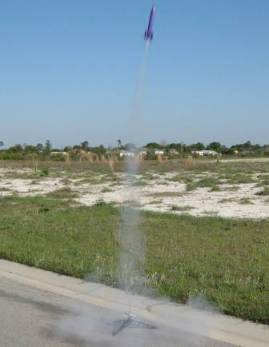 Flight:
Flight:
I prepared the Tri Force for its maiden launch day before. I built my Tri Force with the
recommended baffle so no wadding is needed. I folded the parachute and rapped the shock cord and put it in the body
tube, Launch day. Wind 5 -10 MPH with gusts of 15. Clear and sunny, it was a great day to launch rockets. The first
flight of the Tri Force was on an A8-5 Estes motor. I know the recommended motor is an A8-3, but I did not have one.
Needless to say with the winds and the longer delay, the rocket went up nicely, but came down like a lawn dart. It hit
the sand and two seconds later the ejection charge went off. So I do not think an A8-3 motor would be a good first
motor either. The Tri Force took the landing like a lawn dart, without any damage. Not even the nose cone. The second
flight was on an Estes B6-6. This motor was a good choice and put the rocket around 550 feet and it landed nicely. The
third was on an Estes B6-4. This was the best motor for the day. The rocket flew perfect for the conditions. It was
windy this day and the rocket did not weather cock in any of the launches. The area we where in was too small for any
larger engine. But I would say it will handle a C size motor. An engine hook is used to keep the motors in place.
Pros: This rocket flies very straight.
Shock cord length is appropriate.
With baffle easy to prepare for launch.
Tough, takes rough landing without damage.
Cons: Recommended motor not big enough.
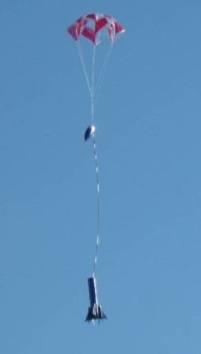 Recovery:
Recovery:
The parachute is the right size for the rocket. The decent rate is such that the rocket
is not damaged upon landing. It even took a lawn dart landing from about 150 feet and was not damaged. The ejection
baffle worked perfectly and the parachute was not burnt or charred.
Flight Rating: 4 out of 5
Summary:
Pros: The Tri Force is a good looking rocket.
Fun to fly and it flies really good.
Cons: Alignment guides too short to wrap around the pod tubes.
Not really a con but the thought should be addressed
The build was fun and a little challenging on the patience, due to all the fin and pod alignment and gluing.
Overall Rating: 4 out of 5
Other:
Overall this was a fun rocket to build and fly. I liked the tube and pod design. The instructions
are straight forward and the illustrations are good. The tube guides being to short, be a minor glitch and was easily
corrected. Sunward classifies this as a Skill Level Two. I would classify it a Skill Level Three build, due to all the
small fins and alignment concerns. Patience is definitely recommended for this build. . The rocket is fun to watch and
is already one of my favorites. I can not wait to put a C size motor in it.
 |
 |
Flights
 |
 |